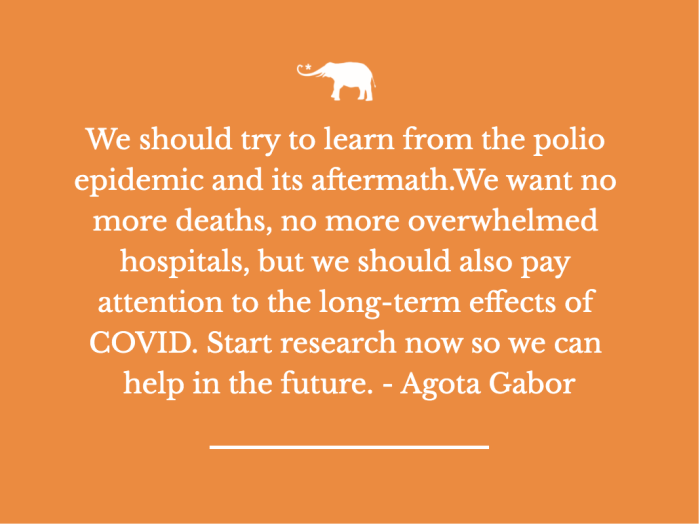I had polio in 1954 at the end of the polio epidemic. This was after living in fear of the polio virus for years, as fatigue set in and the vaccine was still a year away.
I lived in Budapest, Hungary, which was under communist dictatorship, a regime that denied the epidemic’s existence. Some of my friends died, while others ended up spending their lives in wheelchairs. I was lucky. After two months in hospital and one year of gruesome therapy, I recovered to live an active life.
Decades later my symptoms came back. My legs became weak and the same muscles that were affected by the virus wouldn’t work again. Doctors were puzzled by my symptoms; many thought it was just old age. A few knew of the existence of the post-polio syndrome, and none of them could really help.
Sadly still, only a few specialists and those who suffer from it know something about it.
Will the same sad scenario be repeated with post-COVID symptoms and COVID’s long-term side effects? We should try to learn from the polio epidemic and its aftermath.
What we know about post-polio? Not enough. We now know how it happens and why, but not how to help it. We know that when the polio virus damaged our muscles attached to a certain nerve, other muscles from the same group, took over their functions.
Because of that, polio survivors got belter, our muscles got stronger, we improved. Then a few decades later, the muscles that took over the work of the muscles originally destroyed by the virus, started to get tired. After all, they have been doing double shifts for decades. They started getting weaker and post-polio syndrome set in.
Because there was hardly any research done on the possible reoccurrence of the polio symptoms at the time of the epidemic, few healthcare professionals know how to help the polio survivors, now suffering once again. And since polio, in the western world, has been eradicated, most of us with PPS are older. Why spend research money on old people, many ask?
What do we know about post-COVID, the long-term side effects of COVID-19?
There are reports of various long-term or re-occurring post-COVID effects.
The most common are fatigue and headache, loss of focus and attention, hair loss and ongoing difficulty breathing. Three of those could be considered neurological problems, which is not surprising after any serious illness. It correlates to the overall stress to multiple organ systems that COVID is proven to cause.
Nobody is sure, but hopefully researchers will work hard to find out much more.
Is the pandemic almost over? Will there be more variants in our future?
How we feel about it varies geographically and it also depends on our political leanings.
In Florida, where I retreated for the winter, most people pretend that it is over. Many like to claim that COVID is just the flu. In New York or Canada (where I live) people are more cautious.
But we all want to have the pandemic over and put it in our rear-view mirror.
It is natural and essential to feel that way and the priority is and should be to end the pandemic as soon as possible.
We want no more deaths, no more overwhelmed hospitals, but we should also pay attention to the long-term effects of COVID. Start research now so we can help in the future.
If not, survivors of COVID-19 may face a similar fate to those now suffering from the post-polio syndrome.
No research, no money, and no solutions.











Read 0 comments and reply